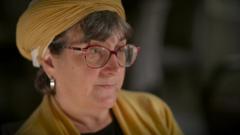Israeli settlers, especially in the West Bank, express hope that Donald Trump's presidency could pave the way for more settlements and potential annexation, challenging existing narratives and policies regarding the region.
Israeli Settlers Optimistic Following Trump's Win Amid Ongoing Tensions

Israeli Settlers Optimistic Following Trump's Win Amid Ongoing Tensions
As U.S. leadership changes, Israeli settlers in the West Bank perceive a new opportunity for annexation.
In the hills of Karnei Shomron, an Israeli settlement overlooking Tel Aviv, residents feel disconnected from the notion of "occupied territory". Sondra Baras, a long-time settler, emphasizes her belief that she lives in Biblical Judea and Samaria, rather than in a disputed area. This sentiment resonates with many settlers, who have grown increasingly confident as they witness the U.S. political landscape shift with Trump’s election.
Since the 1967 Middle East war, the distinction between Israel and the territories it captured has blurred in the narrative of residents here. An audio guide at a local viewpoint promotes the area as an integral part of Israel, reinforcing their long-held beliefs. With Trump as President, Baras sees an opportunity for extending Israeli sovereignty over these territories—an ambition echoed by other local leaders.
Supporters within the incoming administration, such as Mike Huckabee, have expressed views that align with those of the settlers. Huckabee, nominated as U.S. Ambassador to Israel, advocates that the land is historically Jewish, framing the discussion around rights rather than legality. The sentiment has resulted in encouragement from settler leaders, like Yisrael Gantz, who believe Trump’s administration could potentially signal a shift in U.S. policy, particularly in the wake of recent attacks by Hamas.
However, the prospect of formal annexation raises complex political implications. While Trump's past decisions, such as recognizing Jerusalem as Israel's capital, suggest possible support for settlers, annexing the West Bank could jeopardize crucial diplomatic relationships, especially with Arab allies like Saudi Arabia, and create internal dissent amongst moderate American politicians.
Amidst these developments, Palestinians are increasingly concerned about ongoing encroachments on their land. Activists note that demolitions of Palestinian homes, often justified by Israeli courts on legal grounds, align with a broader policy perceived as forced migration. Individuals like Mohaib Salameh recount personal tragedies as their homes are dismantled by authorities, emphasizing the stark disparities in treatment between Israelis and Palestinians.
As tensions simmer, settlers are optimistic about their future under a Trump administration. Simultaneously, many Palestinians feel abandoned and continue to resist what they see as an unjust occupation. The dichotomy represents a critical inflection point in the region's ongoing conflict, indicating the challenges both groups face as they navigate this evolving landscape.






















